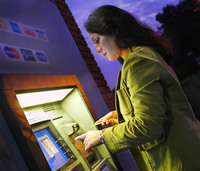New Houston program aims to help the "unbanked"
May 5, 2008
The goal is to create a "Houston account" and have it ready for the public by mid-September. All participating banks would offer the same terms for the starter checking account, such as no minimum balance requirement and the acceptance of alternative identification cards, such as those from Mexican and Guatemalan consulates.
Written by Carolyn Feibel, The Houston Chronicle

Houston hopes to be the second city nationally, after San Francisco, to launch a massive drive to pull "the unbanked" into the mainstream financial community.
The "Bank On Houston" program kicked off today when about 65 local bankers met with city officials to discuss how to reach low-income families who rely on check cashers and pawnshops for their financial transactions.
The goal is to create a "Houston account" and have it ready for the public by mid-September. All participating banks would offer the same terms for the starter checking account, such as no minimum balance requirement and the acceptance of alternative identification cards, such as those from Mexican and Guatemalan consulates.
Cliff Johnson of the National League of Cities decried the high fees charged by predatory lenders and payday lenders.
"We spend so much time trying to boost parents' assets," said Johnson. "We have to pay as much attention to how families hold on to their assets, so their hard-earned dollars don't just go back out the door."
A study of five minority neighborhoods in Houston revealed that as many as 51 percent of the households do not use a regular bank.
Also, seven out of 10 Hurricane Katrina evacuees were "unbanked," so they lost their cash in the flooding, according to the city controller's office.
Controller Annise Parker will coordinate the effort among Houston's bankers. Staff members from the Federal Deposit Insurance Corporation and Federal Reserve also will help.
![]()
![]()
Related Stories
![]()
Fair Use Notice
This site contains copyrighted material the use of which has not always been specifically authorized by the copyright owner. We are making such material available in our efforts to advance understanding of environmental, political, human rights, economic, democracy, scientific, and social justice issues, etc. We believe this constitutes a "fair use" of any such copyrighted material as provided for in section 107 of the US Copyright Law. In accordance with Title 17 U.S.C. Section 107, the material on this site is distributed without profit to those who have expressed a prior interest in receiving the included information for research and educational purposes. For more information go to: http://www.law.cornell.edu/uscode/17/107.shtml. If you wish to use copyrighted material from this site for purposes of your own that go beyond "fair use", you must obtain permission from the copyright owner.